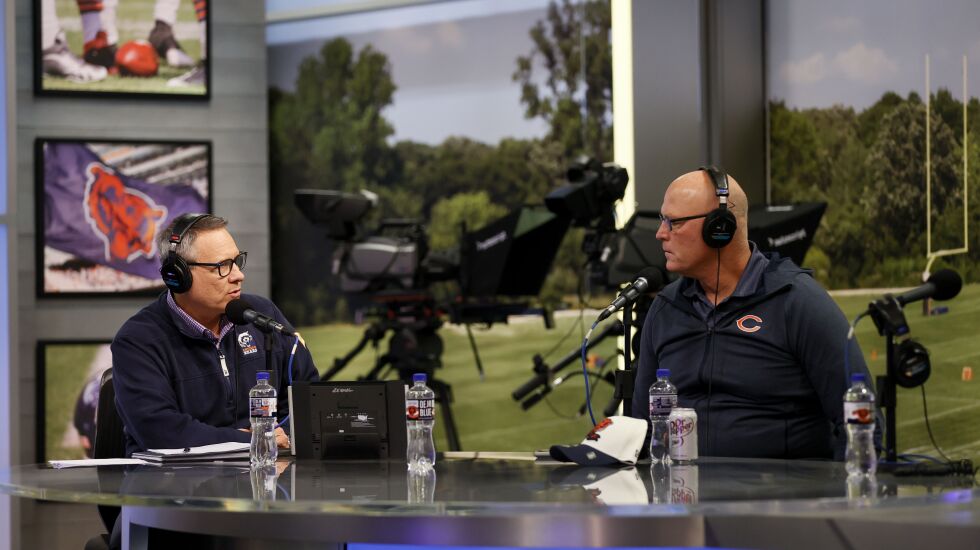
In its first season airing Bears games, ESPN 1000 changed how broadcasts sounded. The station gave Jeff Joniak and Tom Thayer more room to call the action by minimizing ad reads. It also took calls from fans during halftime, a novel approach to a time of the game listeners generally tune out.
It produced local shows before and after the network pregame and postgame shows, turning game days into marathons of Bears programming. And the station used many of its regular talk-show hosts to keep the continuity of its sound and introduce them to new listeners.
“The first year went really, really, really well,” ESPN 1000 director of content Danny Zederman said. “We know there are places to improve. We know there are places we can innovate more in the future. But this first year was a great jumping off point.”
A big reason to carry a team’s games is to increase the non-game audience. It’s the idea that a rising tide lifts all boats. Fans listening to games on a sports-talk station might frequent that station to hear more about their team.
But according to Nielsen Audio, a key portion of ESPN 1000’s audience has dropped, despite the addition of Bears games.
In the fall 2022 ratings book, the station’s share of men ages 25-54 in the Chicago market during prime listening hours (6 a.m. to 7 p.m. Monday through Friday) was 4.2. In the book this past fall (Sept. 14-Dec. 6), which included 11 Bears games to build off, the share was 2.7.
What’s more, sports-talk rival The Score outrated ESPN 1000 on days after games, when fans are still frothing over what happened. Through 14 games, The Score’s next-day listener share in that key demographic was 7.2; ESPN 1000’s was 2.9.
Perhaps listeners remain conditioned from the 23 years that The Score’s sister station WBBM-AM (780) aired the Bears, giving The Score access that ESPN 1000 now enjoys. Or perhaps airing Mike Greenberg’s national show from 10 a.m. to noon thwarts any momentum the local “Kap & J.Hood” show builds.
Or people just prefer The Score. That’s what the numbers say.
This much is certain: ESPN 1000 is unfazed.
In fact, as of Dec. 31, the station no longer subscribes to Nielsen’s ratings – a significant cost savings – which remain the currency by which most stations charge for advertising. It’s not in defiance of a metric the station thinks is flawed. It’s simply a unique way of doing business.
“Ratings isn’t our scorecard,” said Keith Williams, senior vice president and market manager of ESPN Chicago. “Our scorecard is our partners and our fans and our teammates. Are we getting results for our partners, are our fans entertained and are our teammates happy; is this a good environment?”
Williams said that’s the theme for station owner Good Karma Brands, which began operating ESPN 1000 under a local marketing agreement in October 2019 before acquiring it in December 2021. Williams called Good Karma Brands a sports-marketing company that aims to help its advertisers grow.
“I’ll give you a perfect example: Hard Rock Casino, a major advertiser in the Bears,” Williams said. “They were the only brick-and-mortar casino that we advertised in Bears games. They’re the No. 1 casino in northern Indiana. I don’t think we should take full credit for it, but that’s what’s important to us.”
Williams also pointed to Window Nation, which ESPN 1000 afternoon host Marc Silverman endorses.
“Silvy is the No. 1 endorser that gets leads to Window Nation every single month,” Williams said. “What does a rating have to do with anything? First- and third-party data is important to us, but at the end of the day, getting results for our advertising partners, that’s our scorecard.”
Williams said proof of the company’s practice is a pair of businesses he began a relationship with when he started at Good Karma Brands in Madison, Wisconsin, in 1999, two years after its founding. Those businesses are still advertising with the same station.
Without a Nielsen subscription, ESPN 1000 will transact business using other data. Considering the numerous ways listeners can tune in via streaming, Williams said the station has different ways to measure its audience.
That won’t end the comparisons between Chicago’s two sports radio stations. But it’s important to know that they’re not teaching to the same test. Ratings are a part of the story, but they’re not the whole story.
Remote patrol
The Score’s parent company, Audacy, filed for Chapter 11 bankruptcy this week, looking to cut about $1.9 billion in debt to $350 million by giving its debt-holders equity in the company. But The Score is planning business as usual during bankruptcy proceedings.
When WLS-AM (890) owner Cumulus filed for bankruptcy in 2017, it sought to cut more than $1 billion in debt. As part of the restructuring, WLS lost its short-lived rights deals with the Bulls and White Sox. The Score’s agreements with the Bulls and Cubs are expected to be unaffected.
Marquee Sports Network will air coverage of the Cubs Convention, beginning at 5 p.m. Friday with a blue-carpet special, followed by the opening ceremony at 6. Coverage will resume at 9 a.m. Saturday and include sessions with president of baseball operations Jed Hoyer and general manager Carter Hawkins, manager Craig Counsell and members of the 1984 and 2016 teams.
MLB Network will debut a feature on Kenwood’s Kevari Thunderbird during “Hot Stove,” which will air at 8 a.m. Friday from the MLB Dream Series in Tempe, Arizona. The Dream Series is an amateur baseball development camp created to help diversify the talent pool of minority pitchers and catchers. Thunderbird’s father, Kevin, was shot to death in June in Hyde Park.







